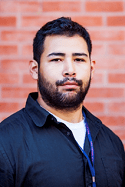Alexander Alvara (Fulbright 2017)
Alexander is a recent alumni who triple-majored in Mechanical, Aerospace, and Materials Science Engineering and minored in Biomedical Engineering and Business. His research includes development of a carbon fiber unmanned drone, a user-controlled prosthetic hand, a mobile phone compatible spectrometer, and an “exosuit” for shoulder and bicep rehabilitation. Alexander was a mentor for the Office of Access and Inclusion and is now a Ph.D. student at UC Berkeley in Mechanical Engineering researching condensed matter physics, high-energy nanotechnologies, and space systems. Alexander is also a recipient of the National GEM Consortium Ph.D. Fellowship, NSF CRFP Honorable Mention, and the Berkeley Chancellors Fellowship. In 2017, Alexander received a Fulbright U.S. Student Program award to research medical robotics and develop pediatric surgical robots for bone biopsy and neurosurgery applications at the University of Toronto in collaboration with The Hospital for Sick Children (SickKids) and Engineering Services Inc., a precision robotics company.
Recently, the SOP office conducted an interview with Alexander, and provided below are his responses about the application process and tips for future applicants:
What did you learn about yourself during the scholarship application process?
During the application process, I learned a lot about asking for help around the campus… I learned I didn’t know my campus as I thought I did. I had been around and I tried to make it my duty to really know what resources were available to me. But, obviously, I didn’t do that great of a job. Because the Scholarship Opportunities Program was a huge help to me and I just found out through chance by walking by one of their workshops.
And the second most important thing that I learned was I may not be the best storyteller when it comes to myself. I can talk about research, I can talk about other things, but that was really a big hurdle for me, learning how to talk about myself during the application.
What are the biggest benefits of working with SOP?
So, the biggest benefit of working with the SOP, was that they had a lot of hands-on help. The fact that they offer so much help and so much feedback was actually a huge, huge factor for me. They helped me through at least 20 revisions and helped me whittle away the problem I mentioned earlier of not being able to talk about myself. They really helped me to grow and develop my writing style and had it not been without them, I am not sure that I would have gotten the scholarship. I went through like 20 revisions of my application, and the strongest ones were usually from, interestingly enough, the strongest revisions came from the non-technical side because it had to be readable for the general audience. For people that are policymakers and people who are administrators, so it wasn’t just about my research.
Do you have any advice for students who are considering applying for scholarships?
My biggest advice would be to just apply. No matter what, apply.
You miss 100% of the shots you don’t take; it’s kind of a cheesy way of saying it.
There was no indication that I thought I was going to get the fellowship and I was already planning on doing something else during that whole time. To me if you don’t apply, you’re not going to get it.

